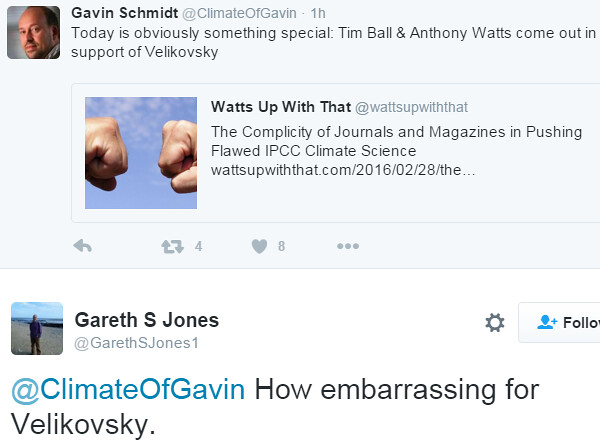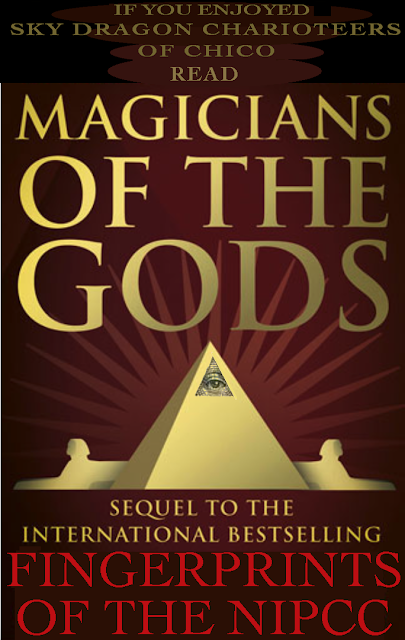Before laying into Hansen's latest, I feel a need to re-establish my taking-the-piss-out-of-the-wackos credentials. And here is a perfect opportunity:
Even Sou struggles to cover this; I think we need Inferno. Or RS. Amusingly, not one of the comments at WUWT so far has dared to mention the V-word.
[Update: There's yet more of this drivel.]
Refs
* Finnish Man Uses Easy Open-Access Journals to Publish Junk Climate Science - Jeffrey Beall; h/t John Mashey.
* VVattsup is more enlightening.
* Number three for Watts.



It's amazing! Neither "The Onion" nor XKCD have anything related to Velikovsky. A whole new avenue of satirical stupidity has been revealed.
Meh. It's just Tim Ball being Tim Ball.
(I assume everyone knows what that means.)
I am deeply shocked by Ball's responese in WUWT:
"I am not “pushing” Velikovsky... I was using Velivovsky to illustrate how mainstream academia reacts when somebody dares to suggest anything other than what they push... Harlow Shapley’s despicable behavior in the matter was exposed by the letter he wrote to Macmillan threatening wto get all academics to withdraw their textbooks. The letter was obtained and revealed by the Harvard Hasty Pudding Club."
From the Harvard Crimson, 1977 [with minor alteration]:
"Through several books and a series of articles [on WUWT*]--a [blog**] devoted almost exclusively to defending [pseudoscience***]--[pseudoscience***] supporters put forward their cabal theory. They identified the scientists' vested interest in their own theories and their general tendency to adopt new concepts much less readily than new facts as primary forces behind the [AGW****] front."
* in Pensee magazine
** journal
*** Velikovsky
**** anti-Velikovsky
The more things change the more they stay the same.
Too bad claques aren't limited to quacks.
According to a computer program using discrete time and Newton's formulation of gravity, the solar system is not stable. In particular Mercury might wander off to a new orbit outside that of Mars or, alternatively, leave the solar system altogether.
WTF, it's Landscheidt redeux
I remember reading Worlds In Collision when I was about 12, it's quite interesting in the category of SF/Fantasy. At the time, I had no idea that people actually took it seriously, since it was such obvious fantasy. It'd be like thinking that Asimov's robots actually existed.
Well, back when Velikovsky was writing, the consensus (-: was nice stable orbits for all -- the planets rolling along in their grooves. Nowadays, he's just off by a few wiggles.
...and a few hundred million years.
What chariots , what horses
Against us dare ride
When the stars in their courses
Fight on our side ?
[You Kipple. Thank you for quoting that; I didn't know it -W]
But Planet X, how cool is that? Not Velikovsky cool, for sure, but enough to add some excitement to the past and future of the solar system.
Cliqueing claques were until recently a thing in your neck of the woods, Russell, although I don't recall ever hearing them quack..
A bit more on the instability of the solar system: First, I vaguely recall there is a theorem stating that the solar system cannot be mathematically stable using Newtonian gravity. Not very helpful because the solar system only has about another 4 billion years before the sun goes red giant on us whereas the mathematical result is about stability forever.
Second, the computer study showed that Venus and Terra mutually stabilize those two orbits; so much for Velikofsky. Also, Jupiter stabilizes Mars, although I did not follow the exposition of that claim.
I think the Solar System is thought to be long-term stable; we're pretty convinced that it's stable on at least 4.56 billion year timescales :-) . There are actually stability criteria that one can determine and which the Solar system satisfies. Maybe the interesting point is that the Kepler satellite has now discovered many multi-planet systems, so it's not as if multi-planet systems with roughly co-planar planets are rare.
I wager some have memories corrupted by this book:
https://en.wikipedia.org/wiki/Worlds_in_Collision
Perhaps Velikovsky read it.
> Also, Jupiter stabilizes Mars
"and Jupiter aligns with Mars"
And don't neglect to mention Internet search guru GWPF's Benny in this regard.
In other news, possibly a month early:
The special theory of relativity has been disproved theoretically
A paper titled 'Challenge to the special theory of relativity' to be published on Physics Essays
International NAC Society
It seems to have escaped Tim that the Macmillan's that published Velikovsky's parted company with Nature 's eponymous publisher in 1896.
Holtzbrinck bought the latter in 1999, and in 2015, Springer bought both.
@8. Andrew Dodds : I recall reading Carl Sagan debunking Velikovsky years ago in a chapter in one of his books.
Come to think of it; (goes to book shelf, finds the text in question) yep. Its chapter 7 (pages 100-159) "Venus and Doctor Velikovsky" in 'Broca's Brain' (Coronet Books, 1979.) which was a very entertaining and effective demolition of the Velikovsky theories of Jupiter spitting out Venus as a comet with Venus then making a lot of close passes round Mars and Earth some few thousand years ago.
***
"Impossible to begin with, doubly fried and atomised, cometary flies do not well survive critical scrutiny." Page 132 Sagan, source a noted above.